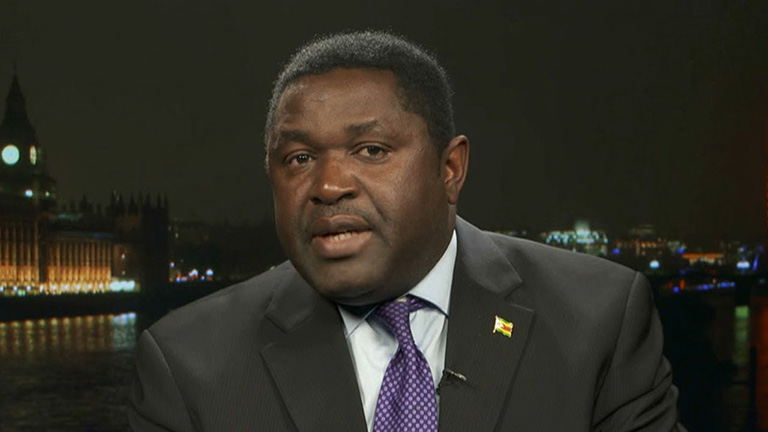Lloyd Msipa: Why Emmerson Mnangagwa is an illegitimate president
By Lloyd Msipa
A country draws its legitimacy through legitimate processes carried out transparently through its institutions. Robert Mugabe had indeed overstayed his welcome as the President of the Republic of Zimbabwe. That is not in contention. What is in contention is the methods employed to remove him.

On the 6th of November 2017 the then Minister of Information, Media and Broadcasting Services, Simon Khaya Moyo at a press conference in Harare announced the dismissal of Emmerson Mnangagwa from the position of Vice President of the country for, among various reasons, disloyalty and conduct inconsistent with his official duties.
“In accordance with the Constitution of Zimbabwe Amendment Number 20 Act of 2013, Section 329, 6th Schedule, Paragraph 14, Sub-paragraph 2, His Excellency the President Cde R.G. Mugabe has exercised his powers to relieve Honourable Vice President E.D. Mnangagwa, of his position as Vice President of the Republic of Zimbabwe with immediate effect.
Before he was expelled, Mnangagwa was one of two Vice Presidents, one of two second secretaries of the political party -ZANU PF. The other vice President and second secretary was Phelekezela Mphoko.
On the 8th of November 2017 following his dismissal Mnangagwa was invited to the Politburo to make presentations in his defence over his dismissal, if he had any. He instead decided to skip the country crossing the border into Mozambique and subsequently into South Africa.
The Politburo was left with no option but to recommend his expulsion. The Central Committee met thereafter and endorsed the Politburo decision. Mnangagwa didn’t challenge or appeal his expulsion from the party in any way.
The expulsion of Mnangagwa was consistent with the Zanu PF party Constitution and the National Constitution.The party now remained with one Secretary and the nation one Vice President.
This therefore meant that when President Robert Mugabe was incapacitated in whatever shape or form, Mphoko became the acting President. This is informed by Article 9, section 46 of the Zanu PF Constitution.
Amidst the chaos and confusion created by the military intervention an extraordinary meeting of the Central Committee was convened and presided over by Patrick Chinamasa the secretary for Finance in ZANU PF at the time.
His functions and responsibilities are spelt out in Article 9, Section 49 of the party Constitution. He had no authority whatsoever to convene, let alone preside or chair a meeting of the Central Committee.
The party Constitution is clear that in terms of Article 7, Section 38, only three people are allowed to preside over the meeting of the Central Committee. The President, or any one of the vice Presidents or the National chairperson.
The provisions read as follows:
“Sessions of Central Committee
38.The President and First Secretary of the party, or, in his absence, one of the Vice Presidents and Second Secretary or the National Chairperson shall preside over the meeting of the Central Committee and at such meeting;
(1) decisions of the Central Committee shall be a simple majority; and
(2) a majority of the total membership shall form a quorum” (the underlining is mine).
“The President and First Secretary of the party, or, in his absence, one of the Vice Presidents and Second Secretary or the National Chairperson shall preside over the meeting of the Central Committee and at such meeting”
The wording of these provisions are final and not subject to challenge.
What this means is that by convening and presiding over the Central Committee meeting of 17th November 2017 Chinamasa acted illegally and ultra vires the Constitution of the party and consequently all the decisions and resolutions were null and void ab initio.
Some of the resolutions are so glaringly audacious in their illegality, for instance, the illegal Central Committee purported to summarily expel members from the party. The party’s Constitution doesn’t allow for summary dismissal.
In fact, the Central Committee acts as a court of appeal in the event that a member is aggrieved by a decision taken after a disciplinary process. It is not the organ of first instance when it comes to disciplinary issues or issues related to expulsion of members.
Furthermore the central committee does not have the power to reinstate a member expelled from the party without that member following due process. It was illegal and scandalous for that central committee to purport to reinstate Mnangagwa.
As a self respecting nation, these illegalities must not be allowed to stand, the Supreme Court Judgement on the leadership dispute in the MDC is instructive.
The conduct of the architects of these illegalities not only robbed ZANU PF members from choosing their own first secretary, they robbed the Zimbabwean citizens of an opportunity to freely choose their own president.
An objective look at all that transpired, it is clear the Mnangagwa was handpicked by no more than 201 party members. The Congress that followed was merely to rubber stamp the decision of these few men and women who had acted illegally.
The extent of the illegality saw several members who had been expelled like Chris Mutsvangwa, Victor Matemadanda attend the meeting to push the illegal agenda. War Veterans who were not members of the central committee also attended and elbowed out legitimate members of the central committee.
The passage of time should never be any excuse to not correct this grave injustice on the people of Zimbabwe. If our courts can go back into the passage of time with other political parties, why not this one.
The independence and fairness of the judiciary is sacrosanct. The legitimacy of all public officials must all be tested fairly and robustly. Choosing our leaders fairly and legitimately must be the rallying point for all Zimbabweans.
Lloyd Msipa LLB (Hons) London UK; LLM (London UK)






